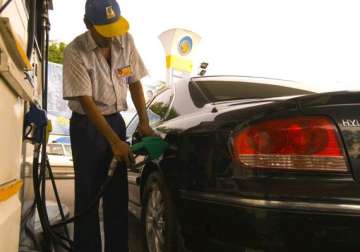New Delhi: Petrol and diesel prices will be hiked by 75 paise a litre each if the government accepts an expert panel report that recommends nationwide fuel standards be upgraded to eliminate cancer-causing particle emissions by 2020.
The Saumitra Chaudhuri Committee on Auto Fuel Vision & Policy 2025 estimated that upgrading refineries to produce Euro-V equivalent petrol and diesel will need an investment of Rs 80,000 crore. This cost can be met by the 75 paise levy on petrol and diesel, it said.
The panel, headed by former Planning Commission member Chaudhuri, suggested that fuels should meet Euro-IV emission norms all over the country by 2017 and Euro-V standards by 2020.
BS VI emission norms are expected to come into effect from April 2024.
Presently, 26 cities including Delhi, Mumbai, Chennai, Ahmedabad and Lucknow use Euro-IV equivalent fuels, also known as BS-IV fuels, while motorists in the rest of the country use BS-III fuels.
“A Special Fuel Upgradation Cess of 75 paise per litre on all gasoline (petrol) and diesel sold in India be imposed and this cess accrue to the Oil Industry Development Board (OIDB),” the panel said in its report.
The accumulated OIDB cess can be deployed to finance the modernisation and upgrading of refineries to enable them to produce Euro-IV and Euro-V grade fuels. It estimated that Rs 64,000 crore will be collected over the seven years from 2014-15 to 2021-22, assuming a modest growth in sales volumes.
In a recent study, the World Health Organization termed air pollution in Delhi as the worst anywhere, while 13 of the dirtiest 20 cities were in India.
The committee asked the government to deregulate diesel prices “such that the refineries are able to fully recover their costs and service the huge capital investments that have been made and will have to be made in order to bring their products in line with the BS-IV and BS-V regimes.” While petrol prices were deregulated in June 2010, the government in January 2013 decided to increase diesel prices by up to 50 paise a litre every month until the difference between the cost of production and retail selling price is bridged.
Presently, the gap is at its lowest ever level of Rs 2.80 a litre.
The panel suggested introduction of BS-IV grade fuel in the whole of northern India—Jammu and Kashmir, Punjab, Haryana, Himachal Pradesh, Uttarakhand, Delhi and a part of Rajasthan and western Uttar Pradesh—by 2015. By 2016, southern India as well as parts of Maharasthra, Goa, Gujarat and Rajasthan should be covered and the rest of the country should get Euro-IV supplies by 2017.
“The roll-out plan of BS-V fuels will begin with the Northern Region and part of Gujarat and Rajasthan from 2019 as is being proposed for BS-IV and all of Gujarat and Rajasthan if logistics and supply conditions permit, and will be completed in the entire country by April 2020,” the report said.
Latest Business News
